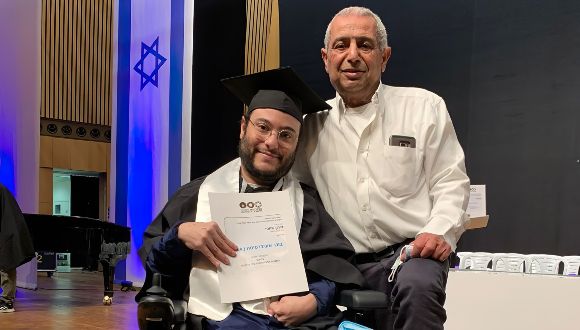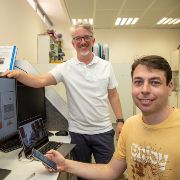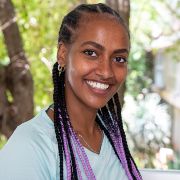Giving Every Student the Opportunity to Study
For recent TAU graduate Liron Shazifi, navigating the higher education system wasn’t easy due to his cerebral palsy. Indeed, Liron says that in high school he didn’t even consider getting a degree until he discovered TAU’s TzavTA program—the only one of its kind in the country that offers students with disabilities or neurodiverse needs the opportunity, resources, and tools to be accepted and fully integrated into their chosen study track.
Liron finished his studies in Education and the Interdisciplinary Humanities Program last year with outstanding marks and hopes to go on to work with other disabled students to help them realize their potential. Unfortunately, in Israel, this potential is often stopped in its tracks at the high school level because university acceptance involves requirements that are inaccessible to those with certain disabilities. For example, the computerized, high-pressure Psychometric exam (similar to the SATs) is particularly challenging for students with limited mobility, which makes typing very difficult, or for those with severe anxiety due to trauma or mental illness.
“University classes provide accessibility options for test-taking, such as extra time, transcribers, or a chance to take a break,” says TzavTA’s program director Prof. Navah Ratzon, who also heads the Stanley Steyer School of Health Professions. “But the Psychometric has standardized conditions and won’t make such allowances. We have to offer a fair alternative.”
Together at TAU
A play on a Hebrew word for “together” with Tel Aviv’s initials incorporated, TzavTA is a year-long program that provides classes on navigating the academic environment, group counseling, and one-on-one academic advisors. Students also begin taking classes in their major, and a special TAU admissions committee decides whether to admit them based on their success.
Though TzavTA does require a high school diploma, it does not reject lower grades since they often do not reflect disabled students’ actual abilities.
“It’s a very challenging program,” says Liron, “but it is accepting of everyone and is truly valuable for anyone who is worried about having trouble in their degree. I wanted to study in an academic institution, and with TzavTA’s help, the gates opened for me.”
Paving His Own Path
Dor Dougma is a recent graduate of the TzavTA preparatory year and a current TAU student. Dor, who is on the autism spectrum, studies Political Science and Communications because he hopes to become a politician; in fact, he has already experienced working for one of the major Israeli political parties in addition to studying. He loves that TAU has introduced him to people who challenge him and how his classes help him understand the world, especially the political world, more clearly.
Dor Dougma discusses his studies (Photo: Rafael Ben-Menashe/TAU)
For Dor, TzavTA was a crucial stepping stone to beginning his career. “I don’t want special treatment or hand-holding. TzavTA gave me the guidance and direction I needed, and now I can do it on my own.”
Struggling to Expand
According to Prof. Ratzon, the TzavTA program can accommodate twelve students per year, but usually only draws between five to ten participants. This is partially because it has almost no budget at all, let alone one for marketing: the program receives free office services from the Occupational Therapy Department at the Stanley Steyer School of Health Professions and students pay only a nominal fee. Moreover, most of the program staff are volunteers, including its founder Dana Kaspi-Zahor.
Kaspi-Zahor created TzavTA as a school project during an accessibility certification program run by Prof. Ratzon. She noticed that disability services were limited to current students but didn’t expand to prospective students and, accordingly, created a comprehensive solution. She now runs the group academic counseling sessions for participants.
Lasting Benefits
TzavTA has already helped around 40 students become full-fledged degree candidates and continues to offer some support throughout their studies. Liron is in a WhatsApp group for TzavTA alumni and is still in touch with friends from his cohort. “It’s a really important program, and participants should take advantage of everything it has to offer,” he says. Dor also notes that the staff’s door is always open if he needs help, although he prefers to use the skills they gave him to navigate for himself. “Everyone deserves the chance to get a degree, and I’m grateful for the chance TzavTA gave me.”
-by Ruth Fertig






